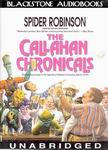
 Sci-Fi Private Eye
Sci-Fi Private Eye
Edited by Isaac Asimov and Martin Greenberg; Read by Bill Fantini and Nelson Runger
4 cassettes – 6 hours [UNABRIDGED]
Publisher: Dercum Audio
Published: August 1997
ISBN: 155656273X
Themes: / Science Fiction / Mystery / Utopia / Dystpoia / Sherlock Holmes / Mars / Berzerker / Time Travel / Artificial Intelligence / Covert Warfare /
Decades ago, SF grandmaster Isaac Asimov noted the similarity between detective “whodunit” stories and science fiction “puzzle” stories. Avoiding some of the obvious pitfalls, he began to write stories that contain elements of both of these popular genres. Later as an anthologist, Asimov teamed up with Martin H. Greenberg to collect the best of this subgenre. Sci-Fi Private Eye was the happy result. Though obviously not recorded under perfect conditions, you can literally hear the pages turning, I was flabbergasted by the love and care that went into the recording of this audiobook. It starts off with a haunting original musical score, then, instead of simply reading the first story, as is typical with nearly every audiobook, it introduces the anthology with a brief but well composed essay on the subject of mystery science fiction! The packaging is not as good, while in a sturdy enough case, the original cover art falls into a category I call “computer designed abstract boring”. Even worse, they spelled Asimov’s name wrong. The cassettes themselves also lack important details (what story starts where and ends where). The stories though are so good that I’ve got to summarize and review them individually:
Stories Included:
Introduction written and read by Isaac Asimov
“Getting Across” by Robert Silverberg
“The Martian Crown Jewels” by Poul Anderson
“Of The Metal Murderer” by Fred Saberhagen
“Mouthpiece” by Edward Wellen
“War Game” by Philip K. Dick
Robert Silverberg’s “Getting Across” is a terrific SF short story told in the first person. It was originally published in the anthology entitled Future City (1973). A future society is in danger. To house the engorged human race, the Earth is entirely covered by one large metropolis. But it isn’t one big city so much as it is a million city-states abutting one another. Each district has its own government, its own customs and industries, and it’s own way of life. Contact between districts is restricted and often dangerous to those who attempt it. All districts rely on a master computer program for the smooth operation of these automated communities. So when Ganfield’s master computer program is stolen, things start to deteriorate quickly. Garbage starts piling up uncollected, food stops being delivered, the climate control system stops working, and the deactivated robotic police force cannot prevent the cannibalism that is only weeks away. The man whose “month-wife” stole the program is sent to find her and bring it back. His task is nearly impossible because even if he can get out of his district getting across will only be the first hurdle. Typical of Silverberg’s great work in the 1970s.
Poul Anderson’s “The Martian Crown Jewels” was first published in A Treasury of Great Science Fiction, Vol. 1 (1959). The Martian Crown Jewels have been stolen! The theft threatens to destroy diplomatic relations between Mars and Earth. Inspector Gregg, of the Earth police force stationed on Mars, is stumped. Who can solve the baffling locked spaceship mystery and avert a galactic catastrophe of cataclysmic proportions? None other than Mars’ greatest consulting detective, Syaloch, a seven-foot feathered Martian who lives at 221B “Street of Those who Prepare Nourishment in Ovens.” Most entertaining.
Edward Wellen’s “Mouthpiece” first saw print in the pages of Fantasy & Science Fiction Magazine’s February 1974’s issue. Most of the stories I’ve read by Edward Wellen tend to be focused on the workings of the human mind, and this one is no exception. This one fictionalizes a fascinating historical curiosity regarding the final hours of “Dutch” Schultz and takes it just that bit farther – into artificial intelligence – leaving us pondering the nature of personality, memory and thought. It’s also a great little mystery to boot!
Fred Saberhagen’s “The Adventure Of The Metal Murderer” was first published in Omni Magazine’s January 1980 issue, and is another in Saberhagen’s long running series of Berzerker short stories. It’s a time travel story that starts in the distant future and then goes back to 19th century London, England. A clever tale that will remind you of Michael Moorcock’s “Behold The Man”.
Philip K. Dick’s “War Game” was first published in Galaxy Science Fiction Magazine’s December 1959 issue. Earth’s traditional enemy, Ganymede, is at it again. They are trying to subvert and soften up the good people of Earth by selling potentially dangerous toys and games as a prelude to invasion. One toy appears to assemble itself over time into a nuclear weapon, another convinces the user that the virtual reality he or she is in is actual reality, and a third is a harmless variation on the board game Monopoly. But the market demand for the inventive Ganymedian games is pressuring the Earth customs to clear the toys for stocking in time for Christmas. If they follow the rules only one will get through to the store shelves. Typically Dickian and thus very entertaining.
Posted by Jesse Willis
